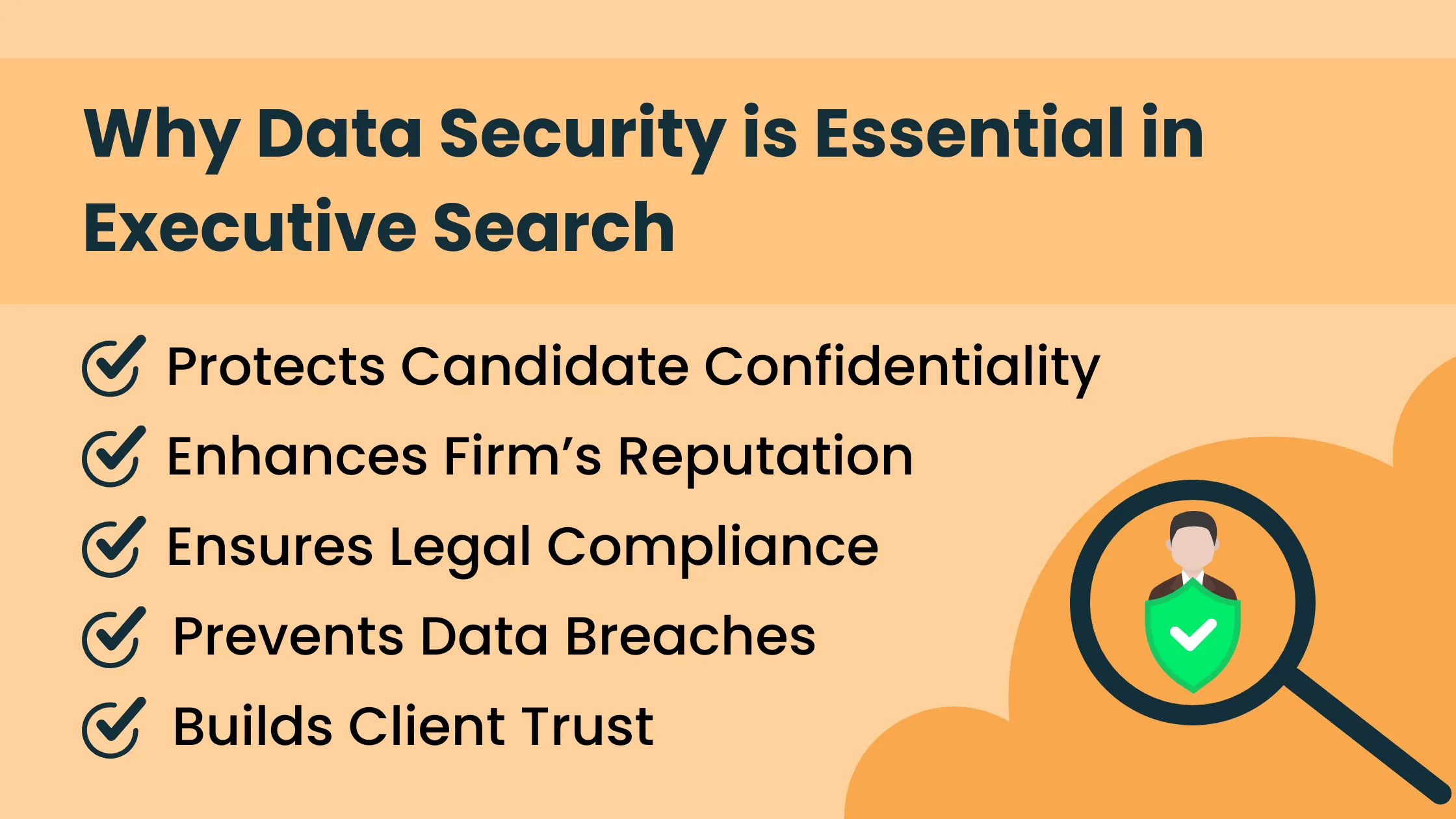TL;DR
- Executive search firms handle highly confidential data requiring stringent protection.
- Compliance with data privacy laws like GDPR, CCPA, HIPAA, and PCI DSS is mandatory.
- Key security strategies include robust policies, secure technology, staff training, audited vendors, regular audits, and incident response plans.
- Prioritising data security builds client trust, ensures legal compliance, and protects your firm’s reputation.
As a company that finds top leaders for other businesses, you deal with highly confidential information about your clients and the people you help. Keeping this information safe and following the rules is very important to keep the trust of everyone involved and to avoid big problems or harm to your reputation.
In this blog, we'll talk about the most important things to know about keeping data safe and following the rules for recruitment software security in companies like yours, and we'll share some useful tips to protect your work with executive search compliance.
Why Data Security Matters in Finding Top Leaders
Executive search firms handle a lot of confidential information, including:
- Candidate resumes, employment history, and personal details
- Client company data, such as organisational structures and hiring plans
- Proprietary research and intellectual property
- Financial information related to placements and fees
This sensitive data must be protected from unauthorised access, misuse, or disclosure. If someone gets access to this data or if we don't follow the rules, it can cause big problems, like:
- Reputational damage and loss of client trust
- Hefty fines and legal penalties
- Disruption to business operations and client relationships
What Data Privacy Laws Must Executive Search Firms Follow?
Following data security best practices isn't just about doing the right thing - it's often a legal requirement. Executive search firms need to follow a growing list of rules about data privacy and security, such as:
- General Data Protection Regulation (GDPR)
- California Consumer Privacy Act (CCPA)
- Health Insurance Portability and Accountability Act (HIPAA)
- Payment Card Industry Data Security Standard (PCI DSS)
Failure to follow these rules may result in big fines and harm your reputation. That's why it's important to use GDPR-compliant executive search software to make your data management easier and safer.
Key Strategies for Effective Data Security Compliance
To manage data security compliance effectively, executive search firms should implement a comprehensive approach that encompasses the following strategies:
1. Implement Robust Data Governance Policies
- Develop clear and comprehensive data security and privacy policies
- Assign roles and responsibilities for data management and protection
- Continuously review and update policies to address new threats and regulations
2. Invest in Secure Technology Infrastructure
- Utilise enterprise-grade data storage and backup solutions
- Implement strong access controls, encryption, and multi-factor authentication
- Deploy advanced cybersecurity tools, such as firewalls, antivirus software, and intrusion detection systems to reinforce security without relying on a VPN replacement.
3. Educate and Train Your Team
- Provide comprehensive data security and compliance training for all employees
- Foster a culture of security awareness and encourage reporting of suspicious activities
- Implement clear protocols for handling sensitive information and responding to security incidents
- Use a dedicated IP to enhance security by restricting access to authorised users and preventing unauthorised logins
4. Vet and Manage Third-Party Vendors
- Thoroughly vet any third-party service providers (e.g., cloud storage, background check partners)
- Ensure vendors meet your data security and compliance standards
- Establish robust contractual agreements and monitor their adherence to policies
5. Conduct Regular Audits and Assessments
- Perform periodic risk assessments to identify vulnerabilities and areas for improvement
- Conduct internal and external audits to verify compliance with regulations and industry best practices
- Act promptly to address any identified gaps or weaknesses
6. Develop Incident Response and Business Continuity Plans
- Establish clear protocols for responding to data breaches or other security incidents
- Implement robust backup and disaster recovery strategies to ensure business continuity
- Regularly test and update incident response and business continuity plans
Using these methods, executive search firms can successfully handle data security rules, keep private information safe, and keep the trust of their clients and candidates.
Conclusion
In today’s digital landscape, executive search firms must treat data security and compliance as a strategic priority. Taking proactive steps to protect sensitive information builds client trust, ensures regulatory compliance, and safeguards your firm’s reputation.
With growing risks and evolving legislation, firms that prioritise data protection will stand out as credible, reliable partners. Learn the essentials of executive search with our Foundational Guide to Executive Search.
FAQs - Frequently Asked Questions
1. Why is data security important in executive search?
Executive search firms handle sensitive data such as candidate information, client hiring plans, and financial details. If this data is leaked or mishandled, it can lead to legal issues, financial loss, and damage to your firm's reputation. Protecting this information is essential for maintaining client trust and business credibility.
2. What data privacy laws must executive search firms follow?
Executive search firms must comply with privacy regulations, including GDPR, CCPA, HIPAA, and PCI DSS. These laws define how personal and confidential data must be collected, stored, and used. Ignoring them can result in severe fines and legal consequences.
3. How can firms ensure compliance with data protection standards?
Compliance starts with clear policies, secure systems, and staff training. Firms should use strong access controls, encryption, and regularly updated security software. Conducting risk assessments and having incident response plans in place are also critical.
4. What should you look for in secure executive search software?
Choose software that offers encrypted data storage, multi-factor authentication, role-based access, and built-in compliance tracking. These features help protect private information and ensure only authorised users can access it.
5. How often should security audits be performed?
Security audits should be done at least once a year. Additional audits may be needed after system updates, regulation changes, or vendor switches. Regular audits help identify vulnerabilities and confirm compliance with data security standards.















